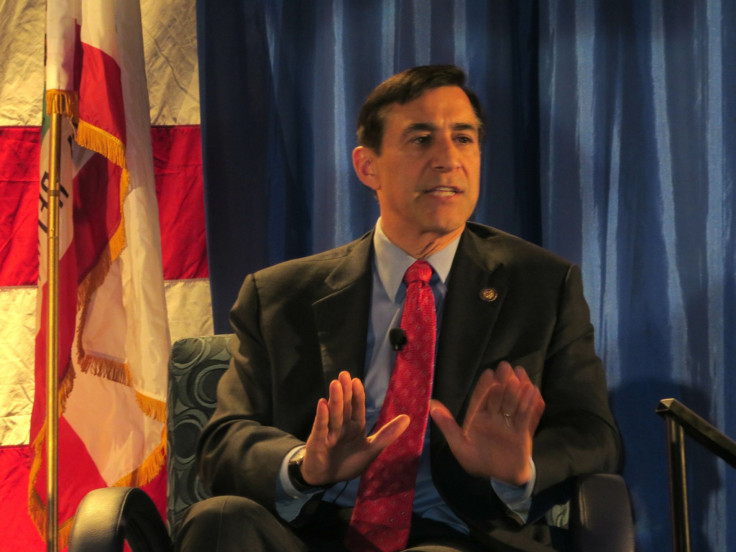Issa Denies Benghazi Probe Is Out To Get Hillary

The investigation of the Benghazi attack is not a ploy to damage Hillary Clinton as a possible 2016 presidential candidate, a leading Republican said Sunday.
"Hillary Clinton's not a target," House Oversight and Government Reform Committee Chairman Darrell Issa, R-Calif., said on NBC's Meet the Press. "President Obama is not a target."
Issa, whose panel is probing the Sept. 11, 2012, assault on the diplomatic outpost that left four Americans dead, said the interagency process of modifying talking points in the wake of the attack scrubbed the fact that the incident was "a terrorist attack from the get-go."
"The American people were effectively lied to for a period of about a month," he charged. "That's important to get right."
Issa charged Sunday that U.S. Ambassador Thomas Pickering - who led an independent review of the attacks on behalf of the State Department - refused to testify at his hearing last week.
Pickering flatly denied that he was unwilling to appear.
"I said the day before the hearings I was willing to appear, to come from the very hearings [Issa] excluded me from," Pickering told NBC's David Gregory. "We were told the majority said I was not welcome at that hearing; I could come at some other time."
Issa said he was unaware of Pickering's late notice but added that a private deposition - which he intends to formally request Monday from the ambassador - is the more appropriate way to begin the inquiry. "The fact is we don't want to have some sort of a stage show," Issa said.
Republicans have been relentless in their questioning of the administration's response to the attack, with leaked documents revealing last week that officials at the State Department suggested edits to talking points that erased references to terrorist groups.
While Hillary Clinton has stated publicly that she was not involved in that editing process, criticism of the former secretary of state and much-discussed possible presidential candidate has been a strong subtext of the Benghazi debate.
Senate Intelligence Committee Chairwoman Dianne Feinstein, D-Calif., said on “Meet the Press” that Issa's panel has deliberately put Clinton's ambitions in its crosshairs.
"My concern is when Hillary Clinton's name is mentioned 32 times in a hearing, then the point of the hearing is to discredit the secretary of state, who has very high popularity and may well be a candidate for president," Feinstein said.
Meanwhile, the National Republican Congressional Committee is using the Benghazi issue to raise money, the Washington Post reported. “Were going after Obama on Benghazi. Help us fight him now,” proclaims a page on the NRCC site.
On a new fundraising page, the committee asks for donations to keep up the fight, declaring it a “coverup” and using pictures of Obama and Clinton.
The page implores supporters to “demand answers.”
On CBC’s “Face the Nation” Sunday, former Secretary of Defense Robert Gates forcefully defended the Obama administration’s action on Benghazi, saying some critics have a "cartoonish impression of military capabilities and military forces."
Gates, a Republican holdover from the Bush administration who stayed on for more than two years of Obama's first term, repeatedly declined to criticize the policymakers who responded to the attack that left four Americans dead, including Ambassador Chris Stevens.
"Frankly, had I been in the job at the time, I think my decisions would have been just as theirs were," said Gates, now the chancellor of the College of William and Mary in Virginia.
"We don't have a ready force standing by in the Middle East, and so getting somebody there in a timely way would have been very difficult, if not impossible," he said.
Suggestions that we could have flown a fighter jet over the attackers to "scare them with the noise or something," Gates said, ignored the "number of surface to air missiles that have disappeared from Gadhafi's arsenals."
"I would not have approved sending an aircraft, a single aircraft, over Benghazi under those circumstances," he said.
Another suggestion posed by critics, to "send some small number of special forces or other troops in without knowing what the environment is, without knowing what the threat is, without having any intelligence in terms of what is actually going on on the ground, would have been very dangerous."
"It's sort of a cartoonish impression of military capabilities and military forces," Gates said. "The one thing that our forces are noted for is planning and preparation before we send people in harm's way, and there just wasn't time to do that."
© Copyright IBTimes 2024. All rights reserved.











